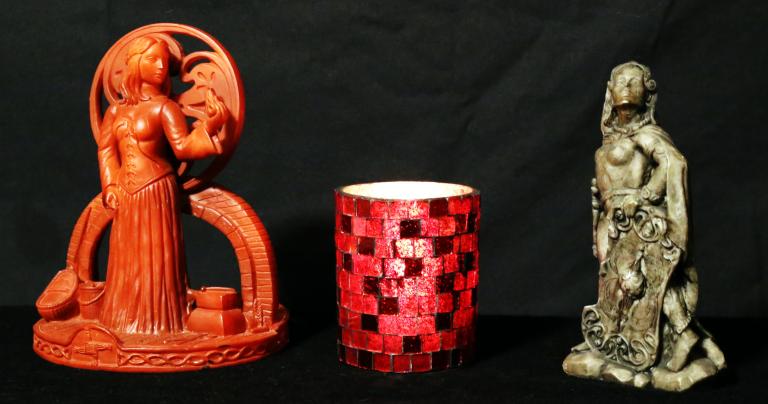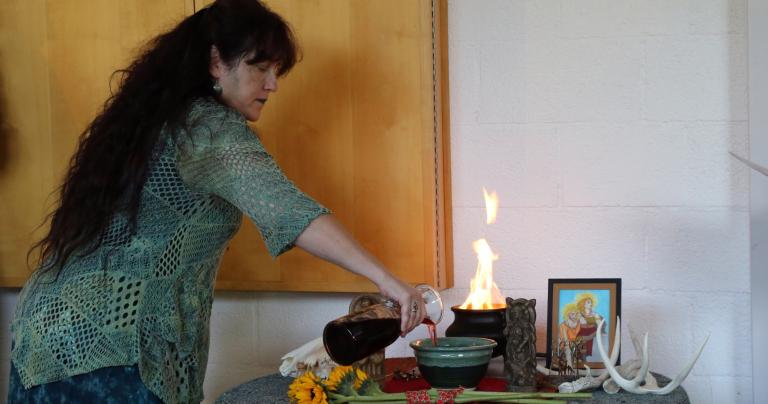Our next Conversations Under the Oaks questions concern approaching the Gods… or in some cases, not approaching Them.
A friend of mine is curious about the Morrigan but is devoted to Brigid. She wonders how she can learn more about the Morrigan without opening herself up to being selected as a disciple.
Good luck with that. If any of the Gods really want you – but especially the Morrigan – They’re going to claim you. And They may not wait till you learn more about Them.
That said, such involuntary selection is relatively uncommon. And simply learning more about a deity rarely results in offers / requests / demands for service… though it is often the first step in that direction.
My first recommendation is to strengthen your ties to Brigid. Make sure you’re completely fulfilling any commitments to Her. Then let Her know what you want to do, and that you would like Her help to insure that She remains your only formal commitment. Then listen for an answer. If you’re not sure of Her response, do divination, or get good polytheist diviner (not an ordinary Tarot reader at a psychic fair) to ask for you.

Then approach the Morrigan. Tell Her what you want to do, and what you don’t want to do. Remind Her of your commitments to Brigid. Again, listen for a response. My experience – both first hand and second hand – is that the Morrigan usually respects your limits.
Usually.
As for learning about Her, there are numerous posts on this blog. Put “Morrigan” in the search block on the right side of the screen (near the bottom of the page if you’re on mobile) and you’ll get everything I’ve written for and about Her.
There are three books I recommend.
Start with The Morrigan: Meeting the Great Queens by Morgan Daimler. It’s a short, concise introduction.
The Morrigan: Celtic Goddess of Magick and Might by Courtney Weber is an experiential guide to Herself.
The Book of the Great Queen by Morpheus Ravenna is a much longer, more academically complete book.
Not every Morrigan book is a good book. But once you read all this you’ll be able to tell the helpful books from the less helpful ones.
I would like to make some offerings to a Goddess, but I don’t know how to make a proper libation. Should I just pour the liquid on the floor/garden and leave it there? And what about food? What should I do with it after I remove it from the altar? Could I just throw it away, or should I burn it or bury it?
So much depends on Who you’re offering to. Different traditions had (and have) very different requirements and rubrics around offerings. What would be appropriate and welcome in one setting would be highly offensive in another.
This is what I do.
Most of my liquid offerings are poured on the ground, or if indoors, into an offering bowl that will later be poured on the ground. Pour as elegantly as you can, and include words of offering: a libation without a prayer is just a spilled drink. Food offerings are crumbled onto the ground and left where local animals can find them – assuming they’re safe for consumption by birds, rabbits, squirrels, and the like.
In a ritual, offerings are often poured or crumbled into the fire. Be careful here – beer and wine have alcohol, but not that much. They can put a fire out. Whiskey is flammable. It can produce a dramatic effect – it can also flare up in your face if you’re not careful.
Sometimes I place the offerings in front of a shrine and leave them there for a time – usually about a half hour. Then I remove them and pour / crumble them outside. Some people leave offerings on shrines for longer times. Alcohol and water will slowly evaporate – so long as they’re still clean (would you drink it?) it’s OK to leave things for a day or two. Never leave anything that’s dirty or spoiled.
Occasionally I practice “reversion of offerings.” Here you place the offerings in front of the shrine, then after a suitable time you eat them yourself. The assumption is that the Gods have taken nourishment from them and have replaced what They took with Their divine essence – you are receiving the blessings of the Gods. This is what Egyptian temple priests did every day for close to four thousand years.
However, in some traditions it is a grave insult to eat what you’ve given to the Gods. Do your research before you do this.
Which one I do depends largely on what the deity I’m honoring tells me They want.
I never throw any offering in the trash or pour it down the drain – this strikes me as highly disrespectful. If an offering cannot be poured on the ground, I burn it or bury it.

Can one follow a priest/ess path without being a devotee to any particular God or Goddess?
Yes, but…
In her very good book A Practical Guide to Pagan Priesthood, Lora O’Brien divides priesthood into pastoral duties (caring for a community and its members) and sacerdotal duties (“all the supernatural bits of a religious belief system”). It is entirely possible to perform pastoral care for a religious community without being devoted to any deity. It’s also possible to serve a God as Their priest and not perform any pastoral duties. That’s what the vast majority of ancient temple priests did.
For me, my identity as a priest is tied to my oaths of service to Cernunnos and to Danu (but not to the Morrigan – my oath to Her is not an oath of priesthood). I occasionally serve as a priest of other deities in ritual, but that is a function and not a relationship, and it’s only for the duration of that ritual.
My pastoral work is important and sacred, and it is what many people think of when they think of “Pagan priest” – someone to call to for spiritual counseling, or to officiate their wedding or funeral. But as I see it, that work doesn’t make me a priest – it makes me a spiritual leader.
Still, different Pagan traditions have different definitions of priesthood. If your definition is one of service to your community but not to a specific deity, I see no reason you can’t call yourself a priest.

















